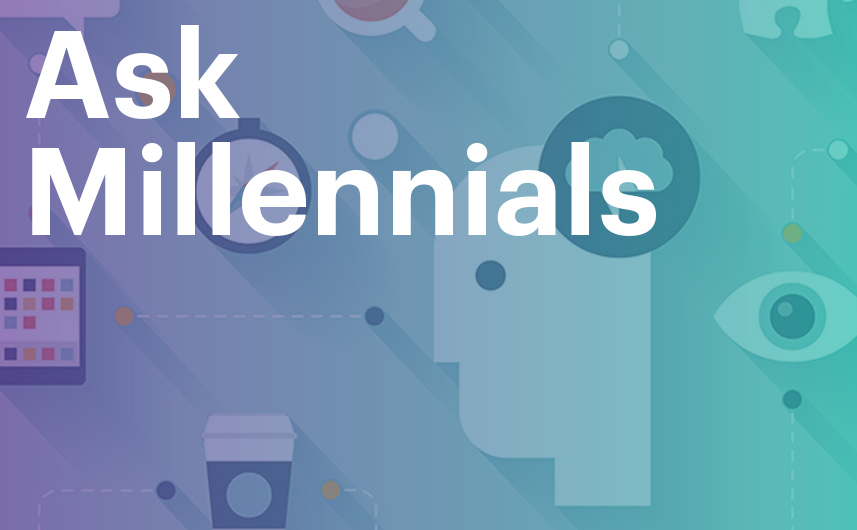This is the fourth installment of “Meaningful Millennials”, our weekly series where we interview millennials on a variety of different subjects that are top of mind for us in the studio.
At Emotive Brand, we believe brands that connect with people on an emotionally meaningfully level perform better and matter more to people. We believe that every brand should be meaningful, empathetic, authentic, emotive, consistent, and purpose-led, and we work with brands to help them to act and feel these ways at every touch-point.
In the studio, the idea of purpose-led and purpose beyond profit are always in discussion. We are constantly talking about what it means to be lead by a purpose, and the impact and meaning that working for and towards a greater purpose creates for our clients.
So this week, as a millennial myself, I wanted to find out what millennials think about the idea of purpose beyond profit. What brands come to mind for millennials as being purpose-led? Do these brands mean more to them? Why?
I heard 12 millennials’ opinions and here’s what I learned.
Brands that stand for a purpose beyond profit matter more to millennials. They make us feel more connected to our world, and encourage us to make decisions that make it a better place. Millennials are more likely to buy brands that they understand are driven by a greater purpose beyond money. These brands make us feel good, and often make decision-making easier for millennials who are inundated with an onslaught of brands each day.
However, many millennials are skeptical and even untrusting of brands who make large, often philanthropic claims of changing the world. Above all, we crave authenticity, honesty, and full transparency. Purpose as a marketing tactic or as a trend is not a purpose worth buying into. True and earnest purpose-led brands don’t just make claims – they emote their promise in how they speak, how they act, how they look, and how they make us feel.
Read more about what these twelve millennials had to say…
“Our generation is thankfully one that seems to have heart, cares about global citizenship, and prioritizes greater purpose. We not only act on and contribute to these values, but we even leave room for them to trend. We have reached a place where connecting with other humans over vast distances is not only feasible, but valued. The combination of possibility and heart demands that we realize our decisions can affect other people in a way that makes a difference. Each decision is logged in a complicated network of human interaction and must be navigated carefully. Sometimes, these decisions manifest in purpose-led giving, where we give wholeheartedly, but fail to think about how this actually impacts the people and communities we care about. Is TOMS putting local shoe-makers out of business? Does FEED really provide decent meals to the people we think it does? Do these purpose-led brands propagate dynamics that further fraction society? Do they require an element of customer deceit to function? These questions stretch us to place ourselves, and our desires for tangible impact and heart-warmth. Above all, I believe we must honor the complexities and nuances of the world (of which there are many) and our engagement with them. To me, a brand is not inherently more meaningful because it is simply purpose-led, but because it is thoughtfully and carefully so.”
—Stellar Levy, Postgraduate Research Assistant, Yale Cancer Center
“Purpose-led brands are important because they exist to improve the lives of those using their product/services and therefore have a greater incentive to do right by their customers and employees. A brand that comes to mind is REI. On Black Friday this year, they started the #optoutside initiative where they closed all their stores to encourage people to get outside and get some exercise rather than spend a day bouncing from store to store. On one of the busiest shopping days of the year, they made a decision to sacrifice the profits they would have made to send a greater message and start a conversation aimed to benefit their customers. That made it very clear that their company values customer wellness more than profits. In general, companies that have preformed duties out of the typical scope to provide their customers the best possible experience always stand out to me and are much more likely to earn my loyalty.”
—Mellissa Gilkey, Professional Basketball Player and Captain, Virum Go Dream in Copenhagen, Denmark
“I think the concept of purpose-driven brands is tremendous and, overtime, could shift the way we view the benefits and results of commerce. But I do often wonder about the earnestness of such brands – especially since there numbers seem to be growing. Change and philanthropy shouldn’t only be used as a marketing ploy to convince consumers that a brand is cool or progressive. The end result may be the same regardless of the company’s sincerity, but unless it is deeply rooted in the culture and not simply a fad to lure socially conscious consumers, there will be little net societal change.”
—JP Waldron, Gallery Assistant, James Cohan
“I’m more inclined to buy something from a company that is working towards some sort of change or that is donating money to a greater cause because it makes me feel like I’m part of better and bigger cause. Also, it’s important for big companies, or at least companies that are making a large profit, to try to have an impact because there are so many things that can be changed or bettered in the world and brands that make enough money should do something important with their funds. If a well-known brand does something selfless, others will follow. I hope the trend moves that direction.”
—Alexandra Rodriguez, Teacher , ITW David Speer Academy
“My personal take is that good business is sustainable and creates value for all stakeholders – they’re not mutually exclusive. For instance, Elon Musk’s ventures (Tesla, SpaceX, PayPal) have all had positive impacts on society, while still achieving financial goals.”
—Kunal Gupte, Business Analyst, Cross-Screen & Programmatic TV, TubeMogul
“I feel that purpose-led brands do not necessarily mean more to me, but I feel better when I purchase their products. For example, TOMS shoes. Everyone needs to wear shoes, so if I am going to buy shoes anyway, why not buy something that I need, and help someone at the same time? The same thing with Newman’s Own. I use salad dressing, so why not put money I am going to spend anyway towards a good cause?”
—Sasha Goldberg, Surgical Coordinator, Tufts University
“Purpose-led brands mean infinity MORE to me because they are bursting with passion. When someone genuinely loves creating an item, it illuminates from the object. You can just tell. I support many smaller businesses because I enjoy hearing the story behind their product and I want to support passionate makers. I am willing to pay more for items if I am aligned with the purpose behind the brand. For clothing, I’m obsessed with Everlane. They are completely transparent about how and where their products are created. Etsy for jewelry, accessories, and apartment finds such as Jujujust, who makes these radiant hand embroidered necklaces, and Frauklarer’s beautiful concrete vases that are great for candles or flowers. Shutters and Shuttles also weaves stunning blankets and scarves from their studio in Nashville. These brands work on a small scale, and it really does feel like each item is created out of a love and passion for the product.”
—Nicole Bell, Channel Marketing Assistant, John Wiley and Sons
“I definitely think purpose-led brands hold great significance for me. Since I want to have a positive impact on the world, investing my money in companies that serve the community and work towards a more sustainable world allows me to make that impact. When companies and brands share the same values I try to uphold, it makes me want to buy and support their products that much more. It gives the conscience consumer a peace of mind, and it personally makes me feel more compelled to continue making smart and beneficial choices. Whether that’s composting, buying Fair Trade, or purchasing a pair of TOMS for their humanitarian work, my values and sense of self are reified as I support the companies and brands to continue leading purposefully. I think it makes me strive to be more mindful when I buy things, and I think that ultimately makes me happier!”
—Chiara Jordan, Narrative Medicine Masters Program, Columbia
“I’ve always been scared of ending up in a Dilbert cartoon and spending my life trapped inside a cubicle, pushing the proverbial pencil to no greater avail, so purpose-driven brands are incredibly attractive to me. For me, work is about so much more than a clock-in-clock-out 9-5 rote existence that only makes money for money’s sake. It’s about feeling engaged with your work and coworkers, and collaborating for something greater than the almighty dollar, whether it’s through encouraging acceptance of bodies in the many forms they come like Dove’s marketing campaigns or paying it forward like Newman’s Own products.”
—John Schmidt, Assistant Editor, Corporate Insight
“I always think of TOMS first, and even American Apparel. I feel like a lot of people buy a product more for the message and brand behind it than the actual product itself. That’s why people buy local or Fair Trade coffee. It’s more about the impact than the actual coffee. It’s what your coffee choice says about you and how much you care about the world.”
—Spencer Soucy, Course Hero
“Brands like TOMS, Warby Parker, and Harry’s all do an incredible job at going beyond what it means to be a traditional brand. They not only offer affordable products to the consumer, but also take on another level of social responsibility by offering their products to those in need in a matching one-to-one model. While these efforts may not always be at the forefront of the consumer’s mind, this model of commerce helps create a sense of purpose and “feel good mentality” to those who engage with the brands.
People want to align themselves with brands and companies that mirror their own images – honest, trustworthy, kind, and altruistic. Brands like TOMS, Warby Parker, and Harry’s are able to align with the consumer’s moral compass and provide products that benefit those in need. It’s pretty incredible that in an age of tightening margins and a desire to increase profits, that there are still brands that are able to look outside their pockets and give back to the world in ways that many brands fail to even consider.”
–Will Matalene, Account Manger, Skift
“Generally speaking, the concept of a purpose-led brand appeals to me. Purpose helps humanize a brand. In some cases, this might just be a savvy business strategy. TOMS vow of donating a pair of shoes for every pair may be an act goodness and also wanting to generate profit. And the two are often not mutually exclusion. Kids are still getting shoes because of their impact, which his more to be said for businesses that don’t embrace this strategy. I also think of Airbnb when I think of purpose-led. They allow a more interactive experience with travel and, in many ways, provide a more affordable option. It’s not just a room to stay, but also a way to interact, meet, and learn from people from different places. It also makes certain areas of the world more easily accessible.”
–Juliet Kinder, Primary School Teacher, Colegio Santa Monica in Palma de Mallorca
Here are our top-line findings from these millennials.
- Purpose matters. Millennials want brands that mirror their own values, aspirations, and intentions.
- It isn’t enough for a purpose-led brand to claim to have some purpose beyond profit. They have to live and emote their promise at every touch-point. We have to trust them.
- Purpose-led brands help millennials make easier brand decisions. Loyalty to purpose-led brands creates positive feelings that make the brands automatically higher value to us. We don’t only get a product, we feel as though we are making a tangible impact with each purchase.
- Although a lot of larger, more well-known brands came first to mind as being purpose-led — TOMS, Newman’s Own, and Warby Parker were reoccurring examples — it seems millennials also value the smaller, often less-known purpose-led businesses as well. These businesses exhibit passion, earnestness, and a humanness that makes us trust them. We feel we play a large role in something that personally and individually matters to us, and we are working to make the world a better place, even in tiny, immeasurable ways.
Next week, we will continue our “Meaningful Millennial” series on teamwork and collaboration in the workplace. If you are interested in contributing to this discussion, email [email protected]

























